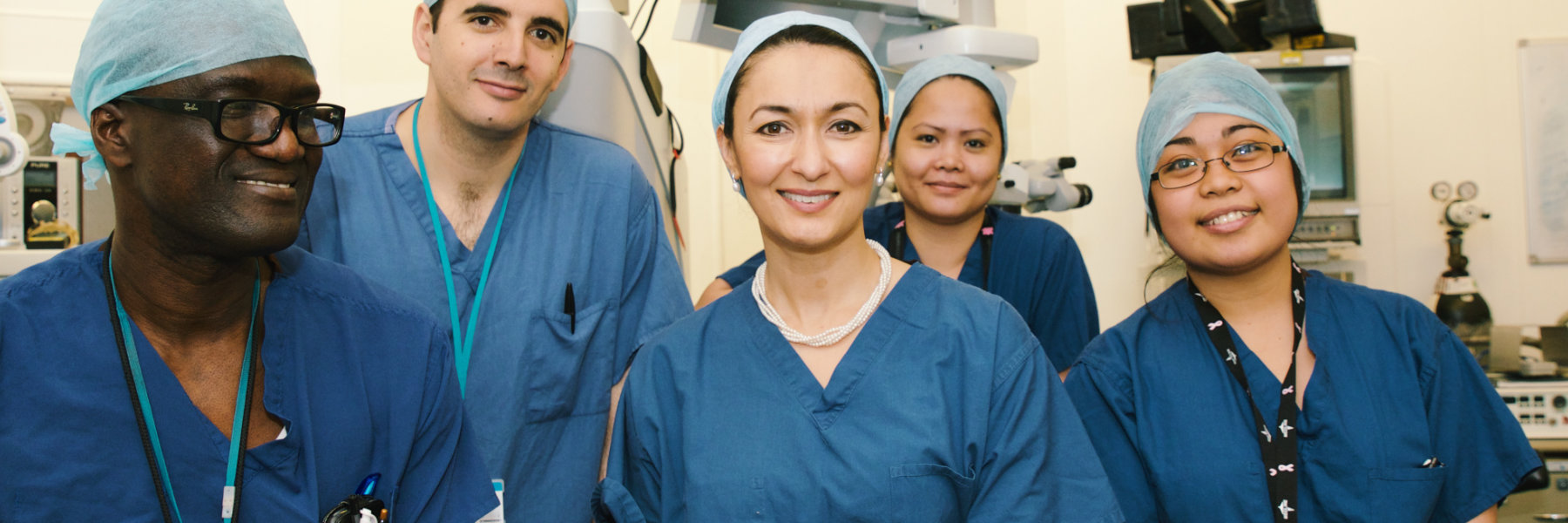What is an Epiretinal Membrane?
An Epiretinal Membrane is a condition where a very thin layer of scar tissue forms on the surface of the central retina, where the vision is sharpest. The part of the eye affected by the Epiretinal Membrane is called the Macula, which is made of special nerve cells and it provides our clear central vision needed for seeing fine detail (reading and driving etc.).
When an Epiretinal Membrane forms over the Macula, it may contract and crumple up the macular retina, resulting in distorted and/or blurred vision.
Why do I have an Epiretinal Membrane?
In most cases the development of an Epiretinal Membrane appears to be related to normal aging changes inside the eye. In some cases it can be related to other conditions such as diabetes, blockage of a blood vessel, inflammation, or following retinal laser or surgery. Epiretinal membranes are not related to Macular Degeneration. Epiretinal Membranes do not usually affect the other eye. They are quite common and affect up to 8% of people in later years.
What should I expect when diagnosed?
In many cases, the discovery of an Epiretinal Membrane is by chance at a routine examination and the vision may not be affected. These Epiretinal Membranes may not change and do not always affect vision. Epiretinal membranes can occasionally get worse, causing blurring and/or distortion of vision. Treatment for Epiretinal Membrane is only required in those cases where the vision has been affected, and your symptoms help decide whether and when to proceed with surgery.
Questions I usually ask
When you have both eyes open (with glasses or contact lenses if you use them)
Are you having difficulty seeing the TV screen clearly or reading subtitles?
· Are you struggling to recognize bus numbers or people’s faces?
· Is it difficult reading small print unless you close the affected eye?
· Do you feel that your glasses aren’t giving you clear vision, and your optician has said that
they can’t improve with a new prescription?
· Do you have distorted vision? Do straight lines look bent or wavy?
· Is it difficult to see clearly when you are driving?
· Are you having difficulty reading music?
· Is your vision affecting your work?
· Do have a particular hobby or interest that your vision is affecting?
Can you see better when you close the bad eye?
Assessment for Epiretinal Membrane

An Epiretinal Membrane is detected during an eye examination following the use of eye drops that temporarily make your pupils large. Sometimes, a special scan of the back of the eye, known as an OCT, or optical coherence tomography, may be needed to confirm the presence of an Epiretinal Membrane

Epiretinal Membrane Removal
If an Epiretinal Membrane affects vision, the only way to treat it is to remove the membrane surgically. This is achieved by an operation called a Vitrectomy and Epiretinal Membrane Peel, where specialised instruments remove the vitreous, a jelly-like substance that normally fills the centre of the eyeball. The removal of the vitreous inside the eye does not cause permanent harm, apart from speeding up the development of a cataract. The vitreous is replaced by natural fluid produced inside the eye. In some cases, a special gas bubble is left inside the eye which disappears on its own over a few weeks.
The operation for Epiretinal membrane removal takes about an hour and it can be performed using a local anaesthetic injection with the patient remaining comfortable and awake during the procedure. However, for patients who prefer, or in some cases when a patient is unable to lie still, general anaesthesia can be arranged as it is very important for the patient to stay still, especially during the very delicate manoeuvres when the membrane is removed using fine forceps.
Following membrane removal, the vision is typically blurred and it can take some months for it to improve. The operation is usually successful in reducing the distortion due to an Epiretinal Membrane sooner than blurred vision. If the vision had not been distorted prior to Epiretinal Membrane removal, improvement in the sharpness of vision and reading is less predictable.
Aftercare following Vitrectomy and Epiretinal Membrane Peel surgery
What should I do following surgery?
Following surgery, you will be given eye drops to use for a few weeks, which will help the eye settle from surgery. The operation does not require staying in hospital longer than one night and patients are typically reviewed in clinic one to two weeks after surgery. If a gas bubble has been used, you may be asked to position your head in a certain way for some part of the day for a number of days. Otherwise, you can do most daily activities although you should abstain from unhygienic environments and anything that puts the eye at risk of injury.
When to seek further advice
All operations carry a risk of complications either during or after surgery. One of the most important complications is infection, although the risk is very low at less than 1 in 500. Infections can be treated with prompt antibiotics. Your eye will usually be red and uncomfortable immediately after surgery, and this is to be expected, but you should contact us if you notice any of the following:-
· Increasing pain
· Increasing redness
· Worsening vision
If you have had a gas or oil bubble in the eye I will have checked the pressure in the eye after surgery. Sometimes, the pressure is normal in the first 24 hours but becomes high in the following few days. High pressure in the eye may cause pain in and around the eye, and you will need to be seen for a repeat pressure check. If the pressure is high it usually responds very well to some additional eye drops that bring the pressure down, and you will be prescribed these for a few weeks.
General precautions after eye surgery
· Use your drops as prescribed. Please do arrange for help with eye drops after your operation if you do not feel you can put them in yourself.
· Cleanse the eye gently with boiled, cooled water.
· Avoid rubbing the eye.
· Do wear the eye shield at night for the first few nights, as it will reduce the risk of accidentally rubbing the eye in your sleep.
· You can be as mobile as you feel comfortable with, but do remember that you have had a big operation and you may feel tired.
· Do not drive in the first few days after surgery as you may not have clear vision with both eyes open and your judgement of distances and your awareness in your peripheral vision may be impaired.
· You may use your vision as much as is comfortable.
How much time off work will I need?
Most people will need at least two weeks off work after surgery. The amount of time off work will depend on the kind of work you do and the kind of surgery that is done. This will need to be discussed when surgery is planned.
Where can I find more information?
The RNIB have further information on epiretinal membranes, especially some practical advice: Helpline 0303 123 9999; internet www.rnib.org.uk; email helpline@rnib.org.uk
The Macular Disease Society: Helpline 0845 241 2041; internet www.maculardisease.org; email: info@maculardisease.org